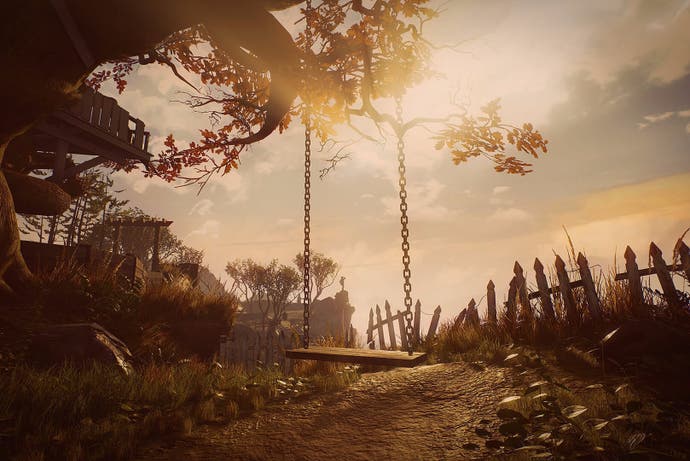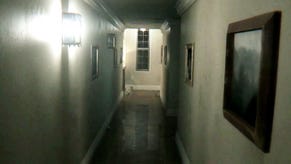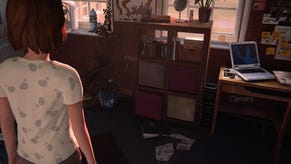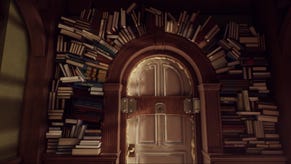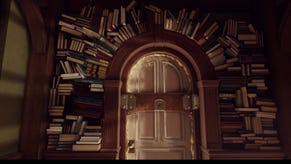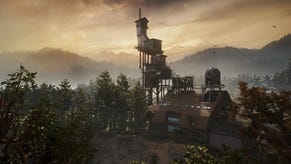What Remains of Edith Finch director Ian Dallas reflects on his unforgettable family drama
A deep dive.
What Remains of Edith Finch, a surreal anthology of short stories centred around an eccentric, uniquely unlucky family, was borne underwater. Creative director Ian Dallas, best known for the whimsical PS3 curio The Unfinished Swan, previously told us that this follow-up effort was inspired by a scuba diving excursion.
"We were shooting for this sense of the sublime," Dallas tells me more recently over Skype. "This thing that is simultaneously fearful and overwhelming."
That's not an easy feeling to capture, but it's one Dallas and company at developer Giant Sparrow achieve in spades. Amusingly, the Santa Monica-based studio's final game features no scuba diving whatsoever. So how did this fanciful familial tale evolve from a subterranean expedition to a collection of weird fiction?
"What we found was that the longer players spend doing the same activity, the more comfortable they get," Dallas tells me. "They kind of slip back into a traditional game-playing mentality, where they start to ignore what's going on in their immediate surroundings and [instead] focus more on the long-term objective. That 'okay, what do I have to do now? What will I have to do in the future?'
"Their eyes were less wide open," he says of players when they stick to any one motion for too long. "And so we opted for [instead of] having one main story and one main mechanic, we'd have a collection of short stories because it was a chance to continually reset player expectations and essentially keep players on their toes."
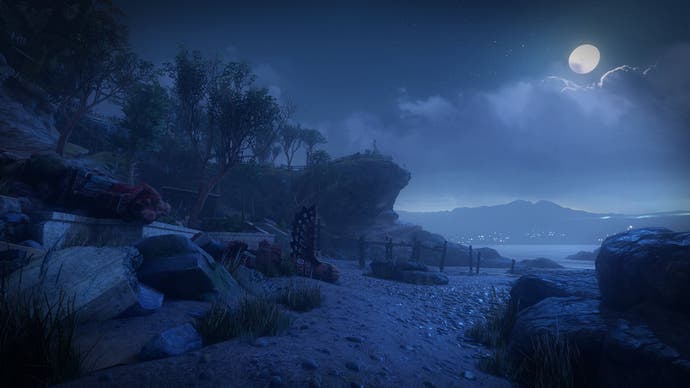
Dallas' biggest inspirations for this sort of quick, surreal jolt of magic weren't game developers at all, but rather fiction writers who specialised in magical realism. He cites authors such as HP Lovecraft, Neil Gaiman, Edgar Allan Poe, and Gabriel Garcia Márquez as primary inspirations for Edith Finch. "The kinds of emotions that we were targeting tend to work best with a short setup," Dallas says. "Like a three-minute joke instead of an hour long joke."
This lean, exacting philosophy is adhered to strongly Edith Finch, where many of its best scenes are only a scant few minutes long. Furthermore, the game's most memorable sequences bear little in common with one another. Some are bombastic and thrilling, others quiet and eerie, and many tow the line between merry and melancholy.
"My interest, personally, is in surprise. In moments that shake people up a bit and present the world in a way people haven't considered before," Dallas says. "That's what I continue to love about art: the ability to experience different perspectives, and to see things with new eyes. And I don't think that's what most video game are about. I think most video games are about challenge, or time-wasting, or spending time with your friends. A lot of [these] things video games do very well, but I don't think a lot are concerned about giving people a new perspective on the world."
This explains Dallas' philosophy behind rapid-fire bursts of experimental game design, but the developer didn't immediately jump from scuba diving to a series of tragic vignettes centred around a peculiar family. That process was a lot more organic. Once Dallas decided to explore the anthology structure he envisioned this nebulous next project as having a Breakfast Club or Canterbury Tales-like setup in which kids would tell each other spooky stories. The problem then was that these stories seemed too disconnected. They needed some kind of narrative throughline.
Then it hit him: all these stories are about death! That's the ultimate unknown, after all. The biggest surprise that we all know is coming. What could be more beautiful and overwhelming than this most permanent of losses?
"By the time that we realised that these stories were all going to focus around death, and that that was going to be the common aspect of these, that each story would end with that person dying, we started thinking 'well, what's the relationship between these stories? And between these people?' And the idea of the family was a really good fit for that," Dallas explains. "It's like 'what survives after someone dies, for people around them?' So the family was a way for us to look at the impact that these stories have beyond the stories themselves."
It's a clever framing device, all told. As Saul Bellow once said, "death is the dark backing that a mirror needs if we are to see anything." If death helps us understand our lives, what contextualises our lot better than looking at the the inevitably tragic ends of our ancestors? When someone dies in a family their story doesn't end the way it does in a campfire tail. Traits, anecdotes, and gossip continue to bleed from the buried in an inescapable way, nestling themselves deep within the hearts of our most inherent, and genetic, social structures.
The familial framework also gave Dallas and company the idea for the ramshackle house tying it all together, both narratively and spatially. This just offbeat residential hub will feel familiar to anyone who's played Gone Home, but where Fullbright used this concept of exploring an abandoned house as the stage for a story, Giant Sparrow uses it as a backdrop. That wasn't always part of the plan though, as the studio could have opted for a simple menu as a minimalist framing device. That would have been much easier to implement, the developer admits. But it wouldn't have fit the medium in as satisfying a way.
"I think when you play a game there's an expectation of continuity," Dallas says. "In the Twilight Zone Rod Serling coming in at the beginning of each episode provides a nice continuity between these totally different episodes from week to week. But the fact that TV episodes are also differentiated by weeks also makes it's okay to have less commonality there. With a video game you're experiencing these things back to back, so we thought there should be something a little bit more continuous. And the house was a really good way for us to invent having all these different stories in one continuous environment that the player can explore."
When asked if Dallas' own family was an inspiration, he said they mostly weren't, but that he has inherited a fiercely determined stubbornness from his grandmother, not unlike Edith's similarly sturdy namesake Edie.
"All of these things are loosely based on me and things that I've observed," he says. "I would say the one that sticks out the most to me would be the benefits and challenges of being a very stubborn person. I look at my own grandmother and she is incredibly stubborn. She makes up her mind about something and it is impossible to change it, and that could be a little bit frustrating when you're on the wrong side of that. But she's also still alive at 96 and part of that is because she's got this very fierce spirit that keeps animating her.
"When I look at What Remains of Edith Finch, a lot of the reason that this game exists is because I was stubborn about certain ideas that I thought could work, even though they didn't seem very promising at the time."
One such idea that Dallas firmly fought for was an early sequence in the game where a little girl transforms into a shark and tumbles down a hillside. Just roll with it.
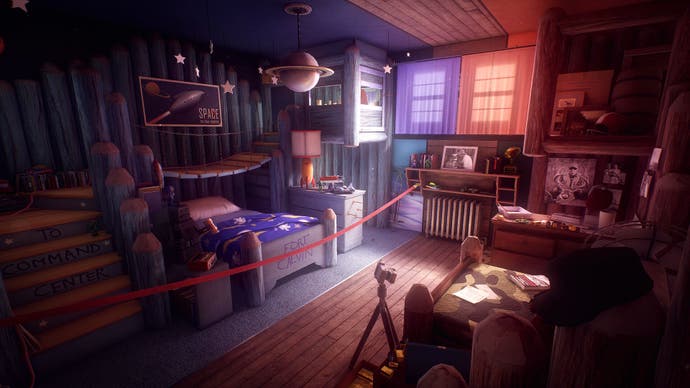
"A year into development we were in a meeting and pretty much the publisher and most of the people on our team wanted to cut that because it just didn't feel like it made any sense," Dallas recalls. "And it didn't really make sense, because you're in a girl's dream. But I felt like it made sense to me and I had to trust that it would make sense in the final version of the game. And I think it does, but it was just me being really stubborn in that moment, not listening to reason. It's that same drive that can also get you into really bad shape if you keep pursuing it when it no longer makes sense. So having the wisdom to know the difference between the good ideas and the bad ideas is just this unending problem." Indeed, the plight of creativity is both a blessing and a curse for the flesh and blood Dallas and the fictional Finches alike.
"Each of the Finch family members is really stubborn," the developer adds. "They do things beyond the point where a lot of people would have called it a day. They don't listen to other people and they can get themselves into very dangerous, but also really beautiful and interesting situations."
The result is a very personal, bold beast of a game indeed, but one that fills me with a few niggling practical inquiries: notably whether Edith Finch's brisk length and premium-by-indie-standards £14.99 / $19.99 price point had harmed the developer's chances of success. This similar situation was a burden for That Dragon, Cancer developer Ryan Green, who expressed frustration that people would simply watch his brief, personal, narrative-driven autobiographical game rather than buy it. Or worse, they'd buy it, rush through, then return it for a refund.
Upon asking Dallas if this oft perceived value proposition was a concern, he seems surprised, like it's a conundrum he'd never once considered.
"It wasn't really something I thought about much before we released it," he tells me. "I think our focus was just on trying to make the best possible game we could, and the experience that works best for the kinds of emotions we were trying to convey. It wasn't really intentional that we'd end up with what for most players would be 2.5-3 hours or so. It's that we sanded off so many of the rough edges that we probably lost about a good hour of gameplay over the last year of development because we made things a lot more intuitive."
"We came to this originally thinking that each of these bedrooms would be experienced kind of like a puzzle. Where you walk into a space and then our goal was to get you to spend a couple of minutes in each bedroom before you go into their story," he recalls. "We found ultimately that it didn't feel right pacing-wise to kind of throw up these artificial blocks for players. Instead we tried to create places that invited exploration, but didn't force players to do that. We cut out a lot of dead wood."
Do you think people ended up simply watching the game rather than playing it, I ask?
"We spent a long time trying to make our game not like a movie," he says. "But there is a lot of enjoyment you get from just watching our game, sitting on a couch or watching on YouTube."
"Unfortunately, in 2017 there are lots of people who like that experience and then can full-on watch Let's Plays and get that experience without conducting any kind of financial transaction with our publishers. So I think there are definitely people who five or 10 years ago would have bought the game and played it, who aren't buying the game now. Which is a little bit frustrating from a financial standpoint, but from a creative standpoint it's hard to feel too upset that 'oh jeez, a million people just watched our game.'
"I kind of wished that they had experienced the game, mostly because we put so much effort into something that was delightful to interact with. I never thought of this as something that you could watch and get that much out of. We've seen several Twitch streams that have over a million views and, yeah, I get it. It's hard to get upset about that, but it is a little strange."
That said, he also believes that artistic quality and financial success aren't related, citing Blade Runner as an example of a cult classic that tanked commercially upon its 1982 theatrical release only to become a cultural touchstone in the decades that followed. "Some of it is just timing and luck and there's so many random factors to it that are not necessarily part of game quality per se," he says.
In other words, Dallas feels like there are too many factors determining what flourishes and fails in the marketplace, and that sort of thing is too beyond his control to worry about. While contractually obligated not to offer exact figures, Dallas tells me Edith Finch's sales were "a good number" but "not stratospheric or anything". The financial end of things can only go up though, and the game's recent Xbox One launch will likely offer a noticeable boost.
The truth is that Dallas, like the various members of the family Finch, doesn't seem particularly concerned with practical realities. He will likely spend his days forging creative expressions whether he makes money doing so or not. He's like a Finch that way, exploding with inventive energy that is equal parts a boon and a burden. Dallas remains a source of the sublime, no matter the cost.
